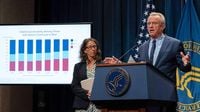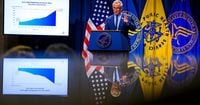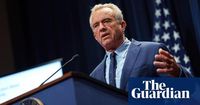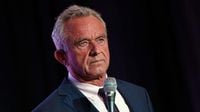In a striking move that has ignited controversy, Health and Human Services Secretary Robert F. Kennedy Jr. publicly contradicted a recent Centers for Disease Control and Prevention (CDC) report on autism, suggesting that environmental factors, rather than improved diagnostic practices, are responsible for a significant rise in autism diagnoses among U.S. children. During a press conference on April 16, 2025, Kennedy asserted that autism is a "preventable disease" and vowed to investigate the environmental toxins he claims are linked to the condition.
According to the CDC's report, released just a day earlier, the prevalence of autism spectrum disorder (ASD) among U.S. children has increased to 1 in 31 by age eight, up from 1 in 54 in 2016. The report indicated that improved screening and diagnostic practices, along with better access to services, have contributed to this rise. However, Kennedy dismissed these conclusions, stating, "The epidemic is real," and called for a shift away from what he termed "epidemic denial." He emphasized that the increase in diagnoses is not merely a consequence of better recognition or changing diagnostic criteria.
"One of the things I think we need to move away from today is this ideology that this diagnosis, rather the relentless increases, are simply artifacts of better diagnoses, better recognition," Kennedy said. He further claimed that industries are profiting from environmental toxins that he believes are driving autism diagnoses. Kennedy stated, "Doctors and therapists in the past weren't stupid; they weren't missing all these cases. External factors, environmental exposures, that's where we're going to find the answer."
In a bid to substantiate his claims, Kennedy announced plans to launch a series of studies within the next two to three weeks aimed at identifying specific environmental toxins, which he believes could include mold, food additives, pesticides, air, water, and medicines. He indicated that these studies would be concluded by September 2025.
However, Kennedy's assertions have drawn sharp criticism from health experts and autism advocates. Alison Singer, president of the Autism Science Foundation, responded to Kennedy's remarks by stating that the CDC's report provides compelling evidence that changes in factors such as access to services and de-stigmatization are leading to the increases in autism prevalence. Singer emphasized that Kennedy's claims about environmental causation lack scientific support, stating, "An overwhelming amount of evidence points to a genetic cause." She further explained that in about 20% of autism cases, one genetic variant can explain the disorder, while others may involve multiple genetic mutations.
Dr. Paul Offit, director of the Vaccine Education Center at Children’s Hospital of Philadelphia, expressed skepticism regarding Kennedy's research initiative, suggesting that the health secretary has already arrived at a predetermined conclusion. Offit stated, "What’s going to happen is you’re going to hear from him that he’s looked behind the curtain at the FDA, looked behind the curtain at the CDC, and he has found things that are shocking to him, shocking about the degree to which Big Pharma has influenced those people."
Kennedy's focus on environmental factors echoes previous statements he has made linking vaccines to autism, a connection that has been thoroughly debunked by numerous studies. Despite this, he continues to assert that genetic factors alone cannot account for the rising prevalence of autism. During the press conference, he stated, "Genes do not cause epidemics. It can provide a vulnerability. You need an environmental toxin." This perspective has alarmed many in the scientific community who argue that the causes of autism are complex and multifaceted, involving a combination of genetic, biological, and environmental influences.
As Kennedy prepares to unveil his studies, he faces scrutiny over the feasibility of his timeline and the scientific validity of his approach. Experts have expressed concern that the expedited timeline for research may lead to flawed conclusions. Dr. Peter Marks, the former top vaccine official at the FDA, cautioned that the unrealistic expectations surrounding the research could mislead the public. "If you just ask me, as a scientist, is it possible to get the answer that quickly? I don’t see any possible way," he remarked.
Moreover, many researchers in the field of autism have reported that they have not been approached by Kennedy or his team regarding the proposed studies. Helen Tager-Flusberg, a member of the Interagency Autism Coordinating Committee, stated, "If the IACC is not involved in this, I don’t know who is at the federal level." This raises questions about the inclusivity and rigor of the research process Kennedy is proposing.
During the press conference, Kennedy also discussed the potential role of parental obesity and age in autism diagnoses, further complicating the narrative surrounding the condition. He stated that the studies would focus on various environmental factors, but many experts remain skeptical about the validity of his claims and the potential impact of his proposed research.
Critics have also pointed out that while the prevalence of autism is higher now than in previous decades, it does not necessarily indicate that the actual incidence of the condition has increased. Many researchers argue that improved screening and increased awareness have led to more accurate diagnoses, particularly among children who may have previously gone undiagnosed.
In light of Kennedy's statements, advocates for the autism community have expressed concerns about the potential stigmatization of autistic individuals. Zoe Gross, director of advocacy at the Autistic Self Advocacy Network, criticized Kennedy's language, calling it "fear-mongering" and emphasizing the importance of respecting the dignity and experiences of autistic individuals. She stated, "Their talk of an autism 'epidemic' is only in service of their anti-vaccine agenda, and does nothing to benefit autistic people."
As the debate over autism diagnoses continues, Kennedy's approach raises significant questions about the intersection of public health, scientific inquiry, and advocacy. While the quest to understand the causes of autism is critical, it is equally important that this inquiry is rooted in sound science and respects the lived experiences of those within the autism community.









